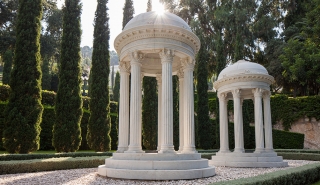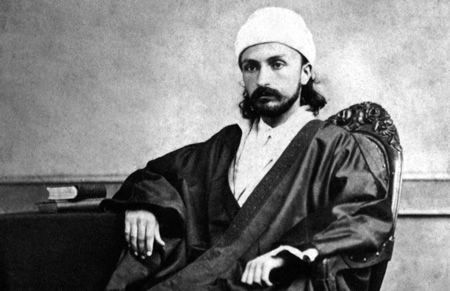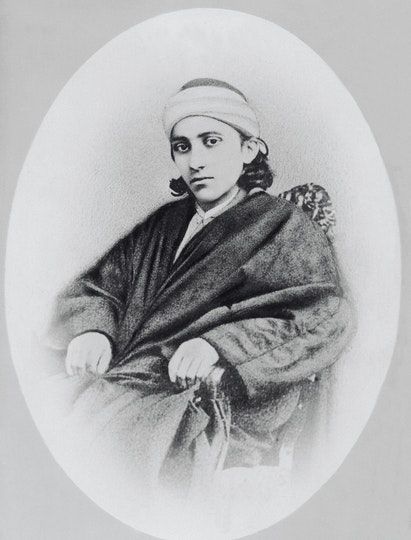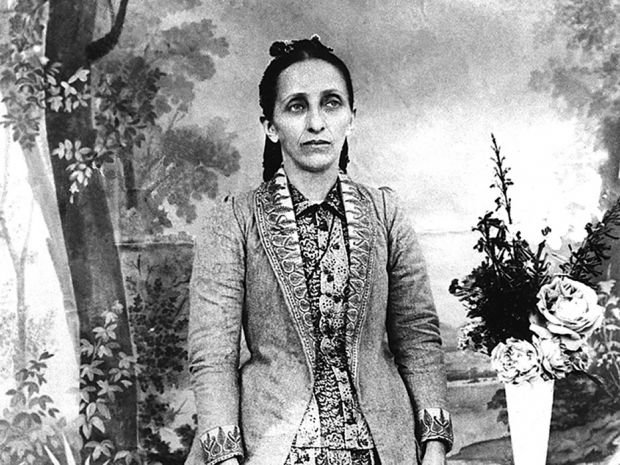Bahá’u’lláh’s Life: United in Love and Respect

Imagine if your family were suddenly thrust into poverty and exiled from your homeland, never to return. When Bahá’u’lláh’s family endured these and many other challenges, they supported one another with love and devotion.
Bahá’u’lláh was nearly 18 years old when He married Ásíyih Khánum in Tihrán, Iran, in 1835. They both came from wealthy families and could have chosen a life of ease. Instead, they spent their time helping those in need. Bahá’u’lláh was called “Father of the Poor” and Ásíyih Khánum “Mother of Consolation.”
Bahá’u’lláh honored Ásíyih Khánum with the title “Navváb,” meaning “Highness” or “Grace.” Women were usually not treated as equals in Persian society, but their relationship was one of mutual respect and love. They had three children. Their eldest son, ‘Abbás Effendi, later took the name ‘Abdu’l-Bahá, or “Servant of Bahá.” They also had a daughter, Bahíyyih Khánum, and a younger son, Mírzá Mihdí.

Portrait of ‘Abdu’l-Bahá in Adrianople (now Edirne), c. 1868
The family’s life changed dramatically in 1852, when Bahá’u’lláh was unjustly imprisoned because of His faith. Their home was ransacked, and most of their possessions were taken. Navváb and her children, who were all under nine, struggled to survive while they worried desperately about Bahá’u’lláh’s safety. At one point, Navváb could only offer her children a handful of dry flour to eat.
After four long months, Bahá’u’lláh was released from prison and exiled to Baghdád, Iraq. This was the beginning of many years of banishment, imprisonment, and terrible difficulties for the family. Yet through it all, they remained united and courageous.
Bahá’u’lláh’s final exile led the family to ‘Akká, in what is now Israel, in 1868. There, Mírzá Mihdí, at the age of 22, died tragically after a fall. Because they were prisoners, the family was not allowed to go to the cemetery for his burial.

Portrait of Mírzá Mihdí, The Purest Branch, son of Bahá’u’lláh
In 1877, Bahá’u’lláh was finally allowed to move to a home in the countryside. ‘Abdu’l-Bahá remained in ‘Akká, where he met with officials on his Father’s behalf and helped to lead the Bahá’í community. Bahá’u’lláh revealed His holy writings and met with Bahá’ís. Bahá’u’lláh praised His son, whom He called “the Master,” saying, “For Us He has become a mighty stronghold, a mighty armour.”*
Throughout her life, Bahíyyih Khánum also served her Father and the Bahá’í Faith with kindness, strength, and wisdom.

Bahíyyih Khánum, daughter of Bahá’u’lláh and Navváb, c. 1895
When Navváb passed away in 1886, Bahá’u’lláh, ‘Abdu’l-Bahá, and Bahíyyih Khánum were at her side. Today, Bahá’ís from all over the globe pray at the resting places of Navváb and her three children on Mount Carmel in Haifa, Israel.
*This is from a Bahá’í’s autobiography and may not reflect Bahá’u’lláh’s exact words.
Photos: © Bahá'í International Community
Bahá’í Faith515 ‘Abdu’l–Bahá136 Master57 Bahá’u’lláh150 Bahíyyih Khánum5 Mírzá Mihdí3 Holy Family28 Navváb6 Exile29 Unity235 Respect64 Love88 Poverty28 Imprisonment22 Tihran11 Baghdad20 Courage64 ’Akká41 Haifa18 Israel54 Bahá’ís in History201 BahaLife27